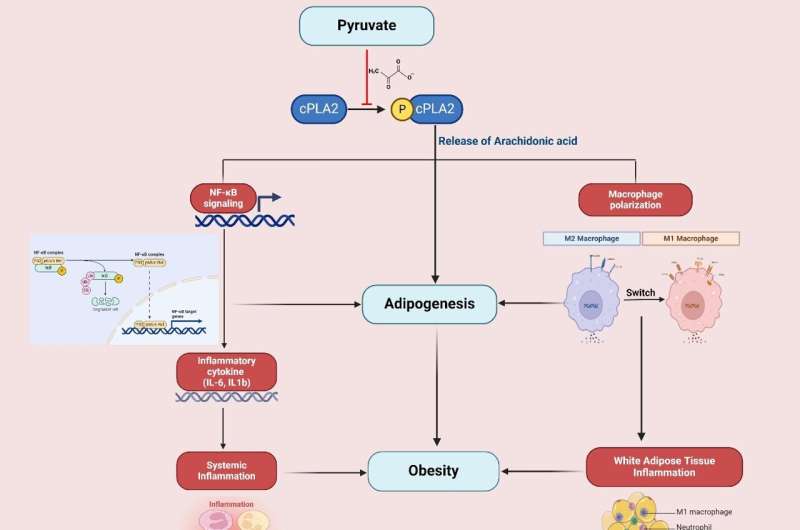This article has been reviewed according to Science X's editorial process and policies. Editors have highlighted the following attributes while ensuring the content's credibility:
fact-checked
proofread
Dietary pyruvate targets cytosolic phospholipase A2 to mitigate inflammation and obesity in mice

An article in Protein & Cell discusses the multifactorial nature of obesity, highlighting its association with chronic low-grade inflammation, or meta-inflammation, which contributes to metabolic disorders. The paper is titled "Dietary pyruvate targets cytosolic phospholipase A2 to mitigate inflammation and obesity in mice."
Pyruvate, a glycolytic metabolite, was found to inhibit adipogenic differentiation in vitro and significantly prevent HFD-induced weight gain and inflammation in mice. Through drug affinity responsive target stability, proteomics, and cellular thermal shift assays, cPLA2 was identified as a target of pyruvate.
Mice with global cPLA2 ablation showed diminished protective effects of pyruvate, confirming the importance of the pyruvate/cPLA2 interaction in mitigating obesity and inflammation. The study underscores pyruvate's potential as a therapeutic option for obesity, given its previous clinical use and safety.
Key findings from the study include:
- Pyruvate was shown to inhibit the differentiation of preadipocytes into adipocytes. In vitro studies demonstrated that pyruvate downregulated key adipogenic transcriptional markers such as PPARγ and CEBPα, along with adipocyte-related genes like Fabp4. Pyruvate reduced intracellular lipid and triglyceride accumulation, indicating its effectiveness in suppressing adipogenesis across different cell types.
- In vivo experiments with male C57BL/6 mice indicated that pyruvate administration significantly prevented HFD-induced weight gain and central adiposity. Pyruvate-treated mice exhibited lower body weights and reduced abdominal circumferences compared to untreated HFD-fed mice. This was accompanied by a decrease in white adipose tissue (WAT) inflammation and metabolic dysregulation.
- The study identified cPLA2 as a novel target of pyruvate using drug affinity responsive target stability, proteomics, and cellular thermal shift assays. cPLA2 plays a critical role in adipocytic differentiation and chronic inflammation. Mice with global ablation of cPLA2 displayed a significant reduction in the protective effects of pyruvate, confirming the interaction between pyruvate and cPLA2 as essential for mitigating inflammation and obesity.
- Reduction of Inflammatory Markers: Pyruvate administration resulted in the downregulation of various inflammatory genes, including IL-6, IL-1B, CCL2, and TNFα. The study showed that pyruvate's anti-inflammatory effects were mediated through the inhibition of cPLA2, which in turn reduced the NF-κB-dependent expression of pro-inflammatory cytokines.
The study establishes pyruvate as a promising therapeutic agent against obesity and its related inflammatory and metabolic disorders. By targeting cPLA2, pyruvate effectively inhibits adipogenesis, reduces WAT inflammation, and prevents HFD-induced weight gain.
These findings highlight the potential of pyruvate as an anti-inflammatory and anti-obesity supplement that could be integrated into regular diets or used as a dietary supplement.
Given its previous clinical use, pyruvate presents a safe and viable alternative for obesity treatment. The study's insights into the molecular mechanisms of pyruvate provide a basis for further research and development of pyruvate-based interventions for metabolic diseases.
More information: Sadaf Hasan et al, Dietary pyruvate targets cytosolic phospholipase A2 to mitigate inflammation and obesity in mice, Protein & Cell (2024). DOI: 10.1093/procel/pwae014





















